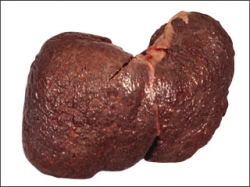Correctly identify signs of liver cancer
Patients infected with persistent hepatitis C (HCV) virus can lead to chronic hepatitis C and then progress to cirrhosis and liver cancer, the third most common cause of death cases. Death is related to cancer.
Worldwide, there are more than 170 million people infected with hepatitis C virus (HCV), and up to 30 to 70% of cases develop into liver cancer due to infection with hepatitis C virus (HCV). The recent identification of a gene variant is associated with increased susceptibility in patients with hepatitis C virus liver cancer, which is of great significance to global health because it has can lead to accurate screening and prediction of liver cancer at an early stage.

Cirrhosis and liver cancer
Michiaki Kubo and colleagues working at RIKEN Genetic Medicine Center and University of Tokyo, Japan, discovered the variant by analyzing the entire genome of 721 patients with HCV viral liver cancer and Compare them with 2,890 healthy people who were negative for HCV virus. This allows researchers to identify possible variants related to HCV viral liver cancer. They confirmed the relationship of a variant, through repeated studies of 673 patients with liver cancer and 2,596 healthy people with negative HCV virus results.
This variant is located in an area on chromosome 6, many of which are important for the function of the immune system. It is between MICA coding genes, a membrane protein that activates the anti-tumor effects of white blood cells, and the HLA-B gene, which encodes a peptide, allowing the immune system. distinguish between specific body proteins and invading bacterial proteins.
Researchers examined other variants of 1,730 patients with chronic hepatitis C but did not develop cirrhosis or liver cancer, and revealed they were significantly associated with the progression of chronic hepatitis C. They lead to liver cancer, but they are not sensitive to chronic hepatitis C.
Finally, Kubo and colleagues examined MICA protein levels in patients with chronic hepatitis C and HCV viral cirrhosis, and found that the concentration of MICA protein in blood samples was elevated in the early stages of Liver cancer compared to healthy people . They also found that the variant was determined through correlation with low levels of MICA protein in patients with hepatitis C.
These findings suggest that patients with genetic variants will have low levels of MICA protein. This will lead to a reduction in the response of white blood cells, resulting in virus-infected cells, increasing the likelihood of developing chronic hepatitis C to the stage of liver cancer.
The results of the study show that low levels of MICA protein are a sign of the progression of liver cancer in patients with chronic hepatitis C, according to Kubo.
- Liver cancer - the disease is easy to die early
- Watch out for signs of liver cancer like artist Bao Quoc
- Watch out for signs of liver cancer
- 10 things you may not know about the liver
- Identify signs of cancer on your body
- Things to know about liver cancer
- Experts explain why cancer is soaring to the top
- Signs help us recognize lung cancer
- 50% of liver cancer patients cannot be treated
- Visible signs of esophageal cancer
- The key to preventing colon cancer attacks the liver
- Watch out for signs of fatty liver disease
 Why is Australia the country with the highest cancer rate in the world while Vietnam ranks 100th?
Why is Australia the country with the highest cancer rate in the world while Vietnam ranks 100th? New drug causes cancer to 'starve'
New drug causes cancer to 'starve' Common cancers in men
Common cancers in men America's incredible discovery: The most feared cancer cell is love
America's incredible discovery: The most feared cancer cell is love